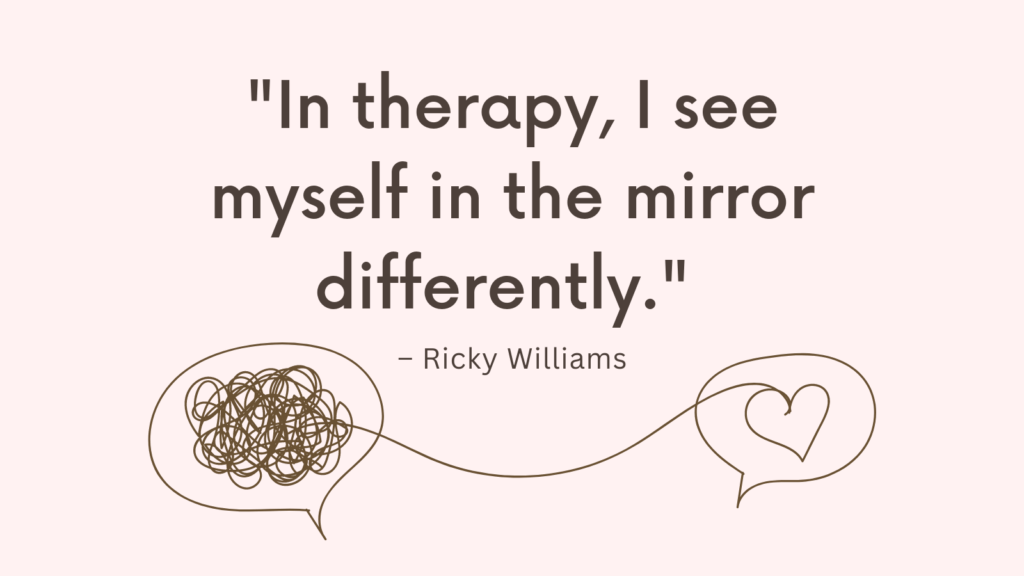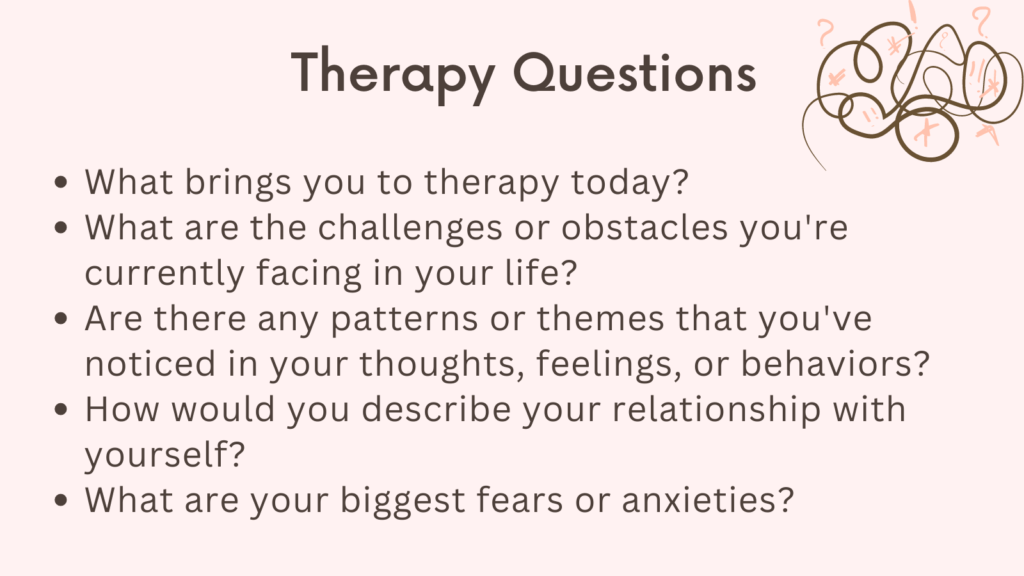In this post, you’re going to learn all about gestalt therapy pros and cons.
What Is Gestalt Therapy?
Gestalt therapy is a humanistic and experiential form of psychotherapy that focuses on the present moment, self-awareness, and personal growth.
It emphasizes holistic understanding, integrating thoughts, emotions, bodily sensations, and behaviors.
Through experiential techniques like dialogue, role-playing, and the empty chair technique, clients explore unresolved conflicts, gain insights, and develop a deeper understanding of themselves.
Mindfulness and body awareness play a significant role in Gestalt therapy, aiding in self-awareness and personal transformation.
Gestalt Therapy Pros And Cons
Gestalt Therapy Pros
Gestalt therapy offers a range of benefits that contribute to overall well-being and fulfillment.
1. Emphasis on Self-Awareness
Gestalt therapy places a strong emphasis on self-awareness as a foundation for personal growth.
Through heightened awareness of thoughts, feelings, bodily sensations, and behaviors, individuals gain deeper insights into their patterns, conflicts, and unmet needs.
This increased self-awareness helps clients develop a greater understanding of themselves and their relationships, paving the way for positive change and improved coping strategies.
2. Focus on the Present Moment
Gestalt therapy encourages individuals to fully engage in the present moment and experience their thoughts, emotions, and sensations as they occur.
By attending to current experiences and avoiding excessive focus on past events or future concerns, clients can cultivate a sense of mindfulness and develop a greater appreciation for the richness of each moment.
This focus on the present moment promotes increased self-acceptance and emotional resilience.
Related: Best 40 Therapeutic Journal Prompts
3. Holistic Approach
A distinctive feature of Gestalt therapy is its holistic approach, which recognizes the interconnectedness of mind, body, and emotions.
This approach acknowledges that all aspects of an individual’s experience are interconnected and influence each other.
By addressing the whole person rather than isolated symptoms, Gestalt therapy supports clients in achieving a balanced and harmonious integration of their thoughts, feelings, sensations, and actions.
4. Encourages Personal Responsibility
Gestalt therapy places a strong emphasis on personal responsibility, empowering individuals to take ownership of their choices, actions, and emotions.
Therapists help clients recognize their agency and explore how their behaviors and reactions contribute to their present circumstances.
By assuming responsibility for their lives, individuals can become active participants in their own growth and make conscious decisions that align with their values and goals.
Related: Best 23 DBT Journal Prompts
5. Promotes Authentic Expression
Authenticity is highly valued in Gestalt therapy.
Clients are encouraged to express and explore their true feelings, thoughts, and desires without judgment or fear of rejection.
This fosters a safe and non-judgmental therapeutic environment where individuals can freely disclose their innermost experiences.
Through this authentic expression, clients can gain clarity, release pent-up emotions, and develop a stronger sense of self-acceptance and integrity.
6. Focuses on the Here-and-Now Relationship
The therapeutic relationship itself is considered essential in Gestalt therapy.
Therapists actively engage with clients in the present moment, working collaboratively to explore immediate feelings and experiences that arise within the therapy session.
This process allows clients to practice new ways of relating to others and develop healthier interpersonal patterns.
It provides valuable opportunities for self-discovery and transformation.
Related: Best 10 CBT Therapy Books
7. Effective for a Variety of Concerns
Gestalt therapy has shown effectiveness in addressing various psychological concerns, including anxiety, depression, relationship difficulties, trauma, and personal growth.
By providing a flexible and adaptable framework, therapists can tailor the therapy to suit individual needs and goals.
Gestalt therapy’s holistic nature allows it to address both immediate challenges and underlying issues, facilitating lasting changes in individuals’ emotional well-being.
Gestalt Therapy Cons
While Gestalt therapy offers numerous benefits, it is essential to consider potential limitations and criticisms associated with this therapeutic approach.
By examining these drawbacks, individuals can make an informed decision about whether Gestalt therapy aligns with their specific needs and preferences.
1. Limited Evidence Base
Critics argue that Gestalt therapy lacks a robust empirical evidence base compared to other therapeutic approaches.
While there is an increasing body of research supporting its effectiveness, the evidence is still relatively limited.
This shortage of empirical data may discourage individuals who prefer to pursue therapies with a stronger scientific backing.
Related: Best 25 CBT Journal Prompts
2. Therapist Subjectivity
Gestalt therapy places significant emphasis on the therapist’s subjective interpretation of the client’s experience.
Some individuals may find this subjective approach unsettling, as it relies heavily on the therapist’s intuition and personal bias.
The perception of the therapist’s judgment or interpretation may hinder clients’ willingness to disclose vulnerable aspects of themselves, potentially limiting the therapy’s effectiveness.
3. Challenging Emotional Experience
Given Gestalt therapy’s focus on present moment experiences, clients may be encouraged to revisit intense emotions and confront unresolved issues.
This process can be emotionally demanding and may lead to temporary discomfort or distress.
While such emotional exploration is considered valuable for growth and healing, individuals should be prepared for the potential challenges that may arise during therapy sessions.
Related: Best 23 Therapist Gifts Ideas
4. Lack of Structured Techniques
Gestalt therapy is known for its emphasis on experiential techniques and creativity, rather than relying on predetermined treatment protocols.
While this flexibility allows customization to meet individual needs, it may leave some clients yearning for more structured guidance.
Those seeking a more structured approach to therapy might find the less directive nature of Gestalt therapy disorienting or less suitable for their preferences.
5. Potential for Overemphasis on the Present Moment
Critics argue that the exclusive focus on present moment experiences in Gestalt therapy may neglect the influence of past experiences and future aspirations.
While striving to live in the present can be empowering, it may overlook valuable insights gained from addressing past traumas, unresolved conflicts, or setting goals for the future.
Individuals seeking a more comprehensive exploration of their life history and future directions might feel unsatisfied with the present-centeredness of Gestalt therapy.
Related: What To Talk To Therapist About: Top 35 Topics
6. Limited Applicability for Certain Conditions
Gestalt therapy may not always be the most appropriate choice for individuals with severe mental health conditions, such as psychosis or severe personality disorders.
The emphasis on immediate experiences and reliance on client awareness could be insufficient for addressing complex psychological issues.
In such cases, a more integrative therapeutic approach or a combination of therapeutic modalities may be more suitable.
7. Variability among Practitioners
As with any therapeutic approach, the effectiveness and quality of Gestalt therapy can vary depending on the skill, expertise, and personal style of the therapist.
Clients may find it crucial to research and select a therapist who aligns with their values and therapeutic preferences to ensure a positive therapeutic experience.
Lack of consistency among therapists could contribute to mixed reviews or dissatisfaction with the approach.
Related: Top 100 Therapy Questions

Conclusion
Gestalt therapy offers numerous advantages that contribute to personal growth, self-awareness, and emotional well-being.
Through its emphasis on self-awareness, the present moment, personal responsibility, authenticity, and the therapeutic relationship, individuals can experience transformative change and develop a healthier and more fulfilling life.
While Gestalt therapy presents some cons and potential limitations, it is important to note that these concerns may not apply to all individuals or situations.
Clients should carefully consider their unique needs, preferences, and the specific challenges they wish to address before deciding if Gestalt therapy is the right therapeutic approach for them.
Engaging in open and honest discussions with a qualified and experienced Gestalt therapist can help clarify any concerns and determine the most appropriate therapeutic path toward growth and healing.



